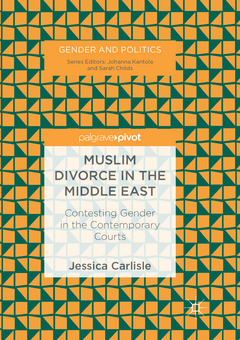Muslim Divorce in the Middle East, 1st ed. 2019 Contesting Gender in the Contemporary Courts Gender and Politics Series
Auteur : Carlisle Jessica

Chapter 1: Muslim Divorce in the MENA: Shari‘a, Codification, State Feminism and Modern Court Systems in Syria, Morocco and Libya.- Chapter 2: The Damascus Shari‘a Court: The Judge, Arbitration and Lawyers in 2005.- Chapter 3: A Legal Aid Centre in Marrakesh: Civil Society Activists and the Court in 2007.- Chapter 4: Tripoli’s Family Court in 2013 and Challenges to State Feminism in post-‘Arab Spring’ Libya and Syria.- Conclusion.
Jessica Carlisle is currently Research Fellow (Legal Geography) on the project Topological Atlas based at Goldsmiths, University of London, UK. She has worked in Syria, Morocco, Libya and Egypt, where she has researched the text and practice of shari‘a derived personal status (family and inheritance) law; constitutional and administrative law; the roles and organization of legal professionals; experiences of migration; and the conduct of politicized domestic and transnational disputes.
Date de parution : 07-2018
Ouvrage de 158 p.
14.8x21 cm
Thèmes de Muslim Divorce in the Middle East :
Mots-clés :
Muslim divorce in the Middle East; Middle East and gender issues; gender in Middle Eastern courts; divorce law in the Middle East; law and politics in the Middle East; gender regimes in the Middle East; Islamic divorce in MENA region; feminism in MENA region; Muslim marriages in the Middle East; legal anthropology; Middle Eastern divorce law reform; Shari‘a and divorce law; Muslim divorce in Syria; Muslim divorce in Morocco; Muslim divorce in Libya; law reform activists in MENA region; state feminism in Syria; state feminism in Libya; family court in MENA region; Islam and feminism


